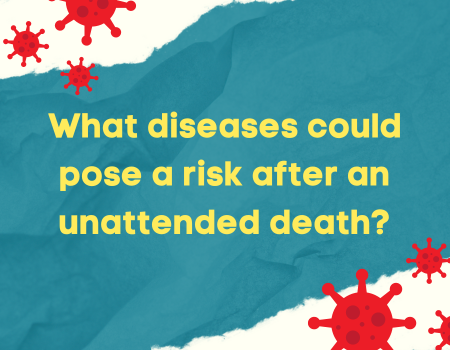The aftermath of an unattended death presents not only emotional and logistical challenges but also potential health risks associated with the decomposition process. The release of bodily fluids and the growth of bacteria can create an environment conducive to the transmission of diseases. In this article, we’ll explore the potential diseases that could pose a risk after an unattended death and discuss the importance of professional cleanup in mitigating health hazards.
What diseases could pose a risk after an unattended death?
 Bloodborne Pathogens:
Bloodborne Pathogens:
- Hepatitis B and C: Exposure to blood and bodily fluids during an unattended death can pose a risk of contracting hepatitis B and C. These viral infections affect the liver and can have long-term health implications.
- HIV (Human Immunodeficiency Virus): While the risk of HIV transmission is relatively low, contact with blood or other bodily fluids may present a potential risk. Taking precautionary measures is crucial to minimize the possibility of infection.
Bacterial Infections:
- Clostridium difficile (C. difficile): The presence of fecal matter, often a result of the decomposition process, can contribute to the spread of C. difficile, a bacterium that can cause severe gastrointestinal infections.
- coli (Escherichia coli): Contamination of surfaces with fecal matter may also introduce E. coli, a bacterium associated with foodborne illnesses and gastrointestinal infections.
Airborne Pathogens:
- Mold and Fungi: Decomposition creates a humid and damp environment, fostering the growth of mold and fungi. Inhalation of mold spores can lead to respiratory issues and allergic reactions.
- Bacterial Aerosols: The release of bacterial aerosols during the decomposition process poses a risk of respiratory infections. Individuals in close proximity may inhale these particles, leading to potential health concerns.
Insect-Related Diseases:
- Vectors for Disease Transmission: Flies and other insects attracted to the decomposing body may serve as vectors for disease transmission. Bacteria and pathogens can be transported by these insects, posing additional health risks.
Professional Cleanup and Health Risk Mitigation:
- Biohazard Cleanup Experts: Engaging professional biohazard cleanup experts is crucial for ensuring the safe and thorough remediation of the affected area. These professionals are trained to handle biohazardous materials and adhere to strict safety protocols.
- Personal Protective Equipment (PPE): Cleanup professionals wear specialized personal protective equipment, including masks, gloves, and suits, to minimize the risk of direct contact with contaminants.
- Disinfection and Decontamination: Thorough cleaning and disinfection are essential to eliminate pathogens and bacteria. Professional cleanup includes the use of industrial-strength cleaners and disinfectants to ensure a sanitary environment.
- Safe Disposal: Biohazard cleanup experts are trained in the safe and legal disposal of contaminated materials. This includes the proper disposal of biohazardous waste to prevent the spread of diseases especially with an unattended death.
After an unattended death, the potential health risks are a serious consideration, necessitating a swift and comprehensive response. Engaging professional biohazard cleanup services is not only crucial for the emotional well-being of those affected but also paramount in mitigating health hazards associated with the decomposition process. By understanding the potential diseases that may pose a risk and taking proactive measures, individuals can contribute to creating a safe and sanitized environment after such a challenging and unfortunate event.

